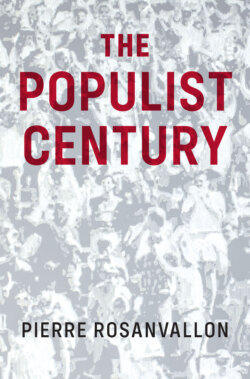Читать книгу The Populist Century - Pierre Rosanvallon - Страница 9
On critiques of populism
ОглавлениеThe most common political critique of populism charges it with illiberalism, that is, with a tendency to make the (“societal”) extension of individual rights secondary to the affirmation of collective sovereignty, and a simultaneous tendency to challenge the intermediary bodies accused of thwarting the action of the elected authorities. I myself spoke, some twenty years ago, of “illiberal democracy” with regard to the Second Empire,7 and I have used the term more recently with respect to populist regimes. The term still seems appropriate to me in almost all cases in which it is used to characterize an observable tendency. But I no longer believe that it can serve as an axis around which to build an effective critique (that is, a critique that advances arguments capable of modifying an opposing opinion), for the simple reason that the leading voices of populism explicitly denounce liberal democracy for curtailing and hijacking authentic democracy. Vladimir Putin, a propagandist for a democracy labeled “sovereign,” has asserted forcefully that liberalism has become “obsolete,”8 while Viktor Orbán, for his part, has insisted that “a democracy is not necessarily liberal.”9 Thus it is on the grounds of a democratic critique of populism that the new champions of this ideal need to be interrogated and contested.
Political life is a graveyard of critiques and warnings that have been powerless to change the course of events. I encountered this phenomenon while studying the history of the nineteenth century in France, when I saw, for example, the inability of the republican opposition to Napoleon III to get its arguments across to the French populace as a whole. The French rose up against a regime that they rightly denounced for quashing freedom, but at the same time they were incapable of seeing through the regime’s claim that its recourse to plebiscites served to honor the sovereignty of the people more than its predecessors had.10 In other words, their intelligence was not equal to their indignation. And this is the case today with those who settle for a liberal critique of populism. This book seeks to break the spell by proposing an in-depth critique of the democratic theory that structures the populist ideology.
This endeavor begins with a detailed analysis of the limits of referendums with respect to a project for achieving democracy. Next, it addresses the question of democratic polarization by emphasizing that a democracy that proposes to make a collectivity responsible for its own destiny cannot be based solely on the exercise of majoritarian electoral power. Since this latter is simply a conventional but notoriously imperfect manifestation of the general will, the general will has to borrow complementary expressions in order to give more consistent body to the democratic ideal. The notions of “power belonging to no one” and “power belonging to anyone at all,” two other ways of grasping the democratic “we,” are examined here, along with the institutional arrangements that may be attached to them, in order to stress the narrowing implied by an exclusively electoralist vision of power belonging to all. I shall also demonstrate in this context that institutions such as constitutional courts and independent authorities, generally viewed only through the prism of their liberal dimension, have a democratic character first and foremost. In effect, they constitute a guarantee for the people in contentious encounters with its representatives. By the same token, this approach is an invitation to conceptualize the relations between liberalism and democracy, that is, between freedom and sovereignty, in inclusive rather than exclusive terms. I shall also examine the popular conception of the notion of “the people” by advancing a sociological critique of the opposition between the 1 percent and the 99 percent. In this context, the notion of a “democratic society to be constructed” is opposed to that of an imaginary “people as one body.”
These assorted critiques of a theoretical nature will be supplemented by critiques focused on the practices of populist regimes, and in particular the conditions under which the polarization of institutions comes into play: modifications of the role and modes of organization of constitutional courts, and suppression or manipulation of independent authorities and especially of electoral oversight commissions, where they exist. To these elements I shall add data concerning policies toward the media, associations, and opposition parties. Taken together, all these elements give body to the qualifier “illiberalism,” which takes on a meaning that we can then assess concretely (the relation between the practices and the justifications of France’s Second Empire will be highlighted in this context). Here I shall pay specific attention to the legal arrangements adopted in order to secure the irreversibility of these regimes and their installation for the long run, most often through the removal of restrictions on term limits.
